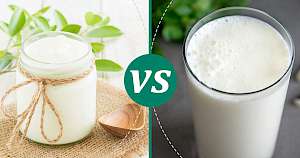Buttermilk vs Plain Yogurt: Nutrition, Calories & Protein Compared


Buttermilk vs Plain yogurt
Nutrition Facts
Serving size:
change
5g10g15g20g30g40g50g60g80g100g120g140g160g180g200g220g250g300g350g400g450g500g600g700g800g900g1000g
1oz2oz3oz4oz5oz6oz7oz8oz10oz12oz15oz20oz25oz30oz35oz40oz50oz
Amount Per Serving:
Serving size:
change
5g10g15g20g30g40g50g60g80g100g120g140g160g180g200g220g250g300g350g400g450g500g600g700g800g900g1000g
1oz2oz3oz4oz5oz6oz7oz8oz10oz12oz15oz20oz25oz30oz35oz40oz50oz
Amount Per Serving:
Buttermilk vs Plain Yogurt 100g Compare
| per 100g | Buttermilk | Plain yogurt |
|---|---|---|
| Calories | 105 | 59 |
| Carbohydrates | 49 g | 3.6 g |
| Fat | 5.78 g | 0.39 g |
| Protein | 34.3 g | 10.19 g |
| Water | 2.97 g | 85.1 g |
| Calcium | 1184 mg | 110 mg |
| Iron | 0.3 mg | 0.07 mg |
| Magnessium | 110 mg | 11 mg |
| Phosphorus | 0.4 mg | 1 mg |
| Potassium | 1592 mg | 141 mg |
| Sodium | 517 mg | 36 mg |
| Zink | 0.4 mg | 1 mg |
| Vitaminium A | 175 µg | 4 µg |
| Vitaminium B1 (Thiamine) | 0.392 mg | 0.023 mg |
| Vitaminium B2 (riboflavin) | 1.579 mg | 0.278 mg |
| Vitaminium B3 (Niacin) | 0.876 mg | 0.208 mg |
| Vitaminium B6 | 0.338 mg | 0.063 mg |
| Vitaminium B9 (Folic acid) | 0.047 mg | 0.007 mg |
| Vitaminium E | 0.1 mg | 0.01 mg |
Discover the Delights of Buttermilk and Plain Yogurt
When it comes to dairy products that are both nutritious and versatile, buttermilk and plain yogurt stand out. These staples, found in kitchens around the globe, are not only celebrated for their culinary uses but also for their health benefits. Interestingly, buttermilk, originally a byproduct of butter making, has evolved into a cultured dairy product with a tangy flavor that enhances baked goods and marinades. Plain yogurt, on the other hand, is a result of fermenting milk with specific bacterial cultures, leading to a creamy texture and slightly sour taste that complements both sweet and savory dishes.
A Tale of Two Textures
The texture of buttermilk and plain yogurt is one of the most notable differences between the two. Buttermilk possesses a thinner consistency, making it an excellent liquid ingredient for recipes that require a bit of acidity and tenderness, such as pancakes or biscuits. Plain yogurt, with its thicker, creamier texture, serves wonderfully as a base for dips, sauces, or as a healthier substitute for sour cream and mayonnaise in recipes.
Flavor Profiles
Flavor-wise, both buttermilk and plain yogurt offer that characteristic tanginess, yet they do so in varying degrees and with different nuances. Buttermilk tends to have a sharper, more pronounced tang, whereas plain yogurt's flavor is milder and can be easily sweetened or blended with fruits and spices for a different taste experience.
Nutritional Nuances
When it comes to nutrition, both buttermilk and plain yogurt have their merits, though their profiles differ significantly. For instance, buttermilk is surprisingly higher in calories and carbohydrates, primarily due to the added cultures and sugars in some commercial versions. On the other hand, plain yogurt, particularly the non-fat variety, is lower in calories and fats, making it a favorite among those monitoring their calorie intake. It's also worth noting that both are excellent sources of calcium, although buttermilk typically offers more of this bone-strengthening mineral.
Protein content is another area where plain yogurt shines, offering a substantial amount that supports muscle repair and growth. Buttermilk, while still a good protein source, usually contains less. Additionally, both dairy products provide a range of vitamins and minerals, including vitamin B12, potassium, and magnesium, essential for overall health.
Health Benefits Galore
The health benefits of buttermilk and plain yogurt extend beyond their nutritional content. Being fermented dairy products, they are rich in probiotics, beneficial bacteria that support gut health and boost the immune system. Regular consumption of these probiotics can aid in digestion and help maintain a healthy balance of gut flora.
Choosing Between Buttermilk and Plain Yogurt
Deciding whether to use buttermilk or plain yogurt in your cooking or as part of your diet depends on your personal preferences and nutritional needs. If you're looking for a lower-calorie option that's rich in protein and can be enjoyed in various ways, plain yogurt might be your best bet. However, if you don't mind the extra calories and are after a distinct tangy flavor for your culinary creations, buttermilk could be the way to go.
In conclusion, both buttermilk and plain yogurt are nutritious, delicious, and versatile ingredients that can enhance a wide range of dishes. Whether you prefer the sharper tang of buttermilk or the creamy texture of plain yogurt, incorporating these dairy delights into your diet is a tasty way to enjoy numerous health benefits.
Buttermilk 100g
105kcalCalories source
- 51% CARBS.
- 36% PROTEIN
- 14% FAT
Plain yogurt 100g
59kcalCalories source
- 25% CARBS
- 69% PROTEIN
- 6% FAT
Compares of buttermilk
- Buttermilk vs Cottage Cheese
- Buttermilk vs Whole Milk
- Buttermilk vs Goat Milk
- Buttermilk vs Sheep Milk
- Buttermilk vs Egg
- Buttermilk vs Egg White
- see all compares of buttermilk
Marcin Piotrowicz
calories-info.com creator
Healthy diet and healthy lifestyle promoter
Add comment